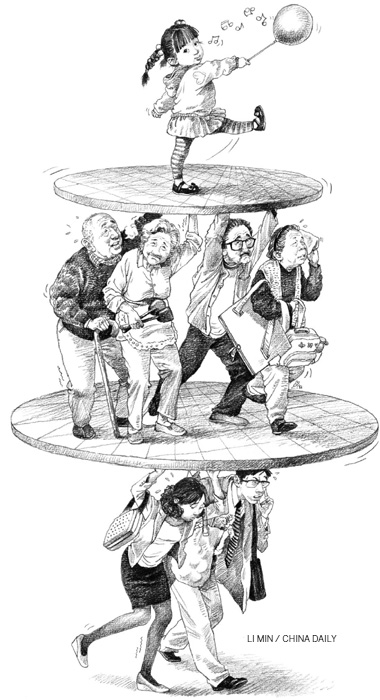Age-old problem looms for families
The 4-2-1 structure poses challenges to providing care for the elderly. After another national holiday spent squeezing onto cramped trains to visit relatives, Li Wenbo and his wife Jia Xuan had the luxury of leaving their 2-year-old daughter with Li's parents this week.
 |
|
4-2-1 family. |
Like many modern couples, being able to get some respite from the daily pressures of parenthood is the best thing about the so-called 4-2-1 family.
The reverse-pyramid dynamic - four grandparents, two parents and one child - is rapidly becoming the new norm in Chinese cities, largely as a result of three decades of the country's family planning policy, which resulted in most couples having only one child.
However, although the first generation born after the policy is reaping the benefits (read: six people to care for one child), sociologists warn that in 10 to 15 years the burden of providing elderly care could be too much for smaller families.
"Even though elders in these 4-2-1 families are in good health now and can help with chores and child care, the problem in the foreseeable future will be the lack of manpower to take care of them," said Yuan Xin, a professor at Nankai University's population and development research institute.
Traditionally, Chinese people are expected to care for their parents in later life. Yet, the fact families are shrinking and people are living longer means younger generations and China's elderly care services face immense pressure in coming years.
China had 100 million one-child families in 2000, according to a research by Yuan. He estimates that by the end of this year, as many as 18 million married couples will include two people born to only-child families.
Results of a 2005 government-backed study of 1 percent of the population also showed the average family size had fallen to 3.13 people (2.97 in urban areas), compared to 4.41 in 1982.
And some 4-2-1 families are already experiencing the problem of elderly healthcare.
When Li Jinya's father was severely injured in a car accident last year, she said it was a shock to realize just how fragile the family structure has become.
"It's lucky my mother is helping to take care of my son," said the 24-year-old, who is juggling the family's grocery store in Beijing's Chaoyang district with caring for her hospitalized father.
"Sometimes I fear that if my parents died, I would be left alone in the world all by myself," she said, fixing her reddened eyes on the half-empty coffee cup in her hand. Her husband Wang Xiaobo, 25, is studying for a post-graduate degree in Hefei, capital of Anhui province, and can only return for short periods.
"He fell asleep at the hospital when he was taking care of my dad," complained Li Jinya. "I know he is tired - I'm tired too - but this is my father's life we're talking about."
The feeling of insecurity has led to tension and many arguments at home, she said. "I can't sleep these days. I feel I should go to see a therapist but I'm too scared."
 0
0 






